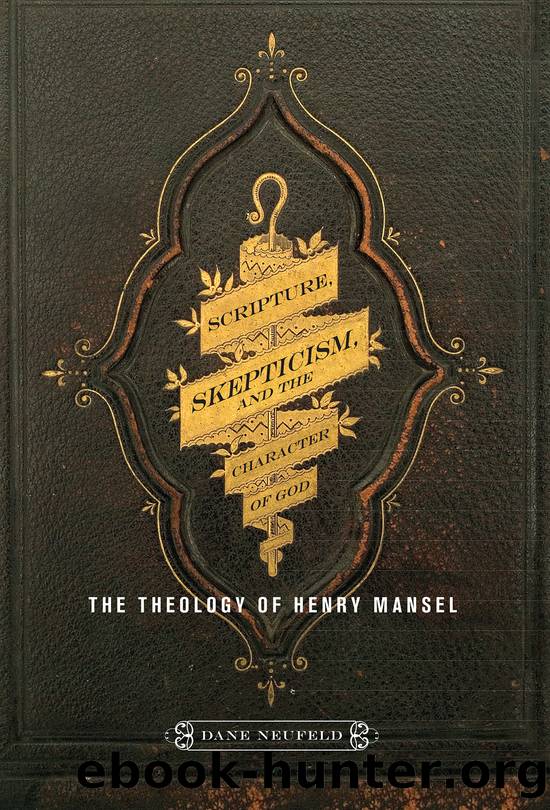Scripture, Skepticism, and the Character of God by Neufeld Dane;

Author:Neufeld, Dane;
Language: eng
Format: epub
Publisher: McGill-Queen's University Press
Published: 2019-05-21T00:00:00+00:00
6
Mansel in the Twentieth Century
If Manselâs reputation as a defender of Anglican orthodoxy was fatally imperilled by the association of his ideas with those of Herbert Spencer, his twentieth century interpreters, in certain respects, have done little more to clear his name. This is especially true in the case of Don Cupitt, one of Manselâs most thoughtful and attentive readers. Cupittâs religious nonrealism, most famously published in his book Taking Leave of God (1980), bears strong Manselian themes that can be traced back clearly to his early articles on Mansel published in the late 1960s. In this respect, Cupitt is one of the few Anglican theologians to appreciate Manselâs thought in a manner roughly akin to the presentation of third and fourth chapters in this book. Though, as is well known, Cupittâs own thinking has developed dramatically since the 1960s, and while certain aspects of Manselâs thought have not entirely disappeared â the practicality of religion, and the anthropomorphic character of scriptural language, for example â Manselâs governing themes and intentions have clearly been forgotten. In 2006, Cupitt remarked that The Limits of Religious Thought is âa book that always has a few admirers â including, in the 1960s, me.â1
Manselâs nineteenth-century critics judged his understanding of human reason to be overly constricting and exclusive of the spiritual character of human knowing. Whether in terms of the absolute, the eternal consciousness, or the incarnation, writers like Green, Bradley, and the Lux Mundi theologians were eager to articulate reality as a spiritual whole that could embrace the rapid changes and seeming progress of the modern world. However, in the twentieth century it has been Manselâs supernaturalism and his high view of scripture that have garnered resistance. To this end, his ideas have been engaged and implemented by theologians who have sought to advance immanentist and nonrealist accounts of the Christian faith that relinquish the capacity of scripture, in particular, to meaningfully refer to the character and reality of God.
However, in this chapter I argue that the skepticism and nonrealism of Don Cupitt and much of twentieth-century Anglican theology is not a direct extension of Manselâs skepticism but the result of a weakening confidence in scriptureâs capacity to witness to Godâs character and describe Godâs presence in the world. This is a second form of skepticism that is easily confused with Manselâs, but in fact it has more in common with the idealist tendency to dissolve scriptural claims into the immediacy of spiritual experience in the service of a comprehensive and all-embracing metaphysics of explanation. Yet, as argued in the preceding chapters, these varying attempts to place the Christian faith within a metaphysical scheme that could make sense of modern developments time and again stumbled over the question of Godâs character as it is described in scripture. This pertained especially to the Old Testament and to atonement theology: notions of Godâs anger, judgment, and even violence became difficult to place within a progressive metaphysics that demanded a moral uniformity, which, in Manselâs terms, the Bible could not quite provide.
Download
This site does not store any files on its server. We only index and link to content provided by other sites. Please contact the content providers to delete copyright contents if any and email us, we'll remove relevant links or contents immediately.
| Africa | Americas |
| Arctic & Antarctica | Asia |
| Australia & Oceania | Europe |
| Middle East | Russia |
| United States | World |
| Ancient Civilizations | Military |
| Historical Study & Educational Resources |
Cecilia; Or, Memoirs of an Heiress — Volume 1 by Fanny Burney(32075)
Cecilia; Or, Memoirs of an Heiress — Volume 3 by Fanny Burney(31469)
Cecilia; Or, Memoirs of an Heiress — Volume 2 by Fanny Burney(31419)
The Secret History by Donna Tartt(18212)
Sapiens: A Brief History of Humankind by Yuval Noah Harari(13995)
Leonardo da Vinci by Walter Isaacson(12812)
The Radium Girls by Kate Moore(11634)
Sapiens by Yuval Noah Harari(5126)
How Democracies Die by Steven Levitsky & Daniel Ziblatt(4967)
The Wind in My Hair by Masih Alinejad(4850)
Homo Deus: A Brief History of Tomorrow by Yuval Noah Harari(4694)
Endurance: Shackleton's Incredible Voyage by Alfred Lansing(4514)
Man's Search for Meaning by Viktor Frankl(4297)
The Silk Roads by Peter Frankopan(4275)
Millionaire: The Philanderer, Gambler, and Duelist Who Invented Modern Finance by Janet Gleeson(4113)
The Rape of Nanking by Iris Chang(4024)
Hitler in Los Angeles by Steven J. Ross(3803)
Joan of Arc by Mary Gordon(3792)
The Motorcycle Diaries by Ernesto Che Guevara(3790)
